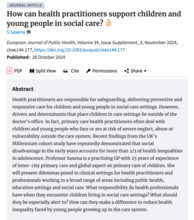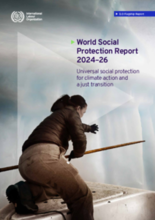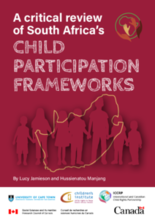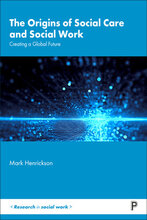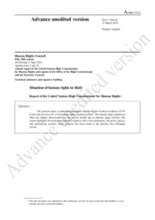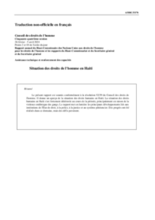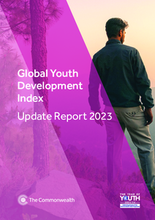Displaying 1 - 10 of 461
This report examines how rising child poverty, social exclusion, and anti-rights movements across Europe threaten children’s rights, emphasizing the urgent need for collective action and strong civil society engagement. Focusing on vulnerable children, it reviews progress on the European Child Guarantee and broader rights issues—from mental health and protection systems to digital rights, housing, and social investment.
The author of this article is a practising GP with 25 years of experience of inner-city primary care and a global expert on primary care of children and she presents dilemmas posed in clinical settings for health practitioners and professionals working in a broad range of areas including public health, education settings and social care to help reduce health inequality faced by young people growing up in the UK care system.
With a sharp focus on the climate crisis, this report provides a global overview of progress made around the world since 2015 in extending social protection and building rights-based social protection systems. In doing so, it makes an essential contribution to the monitoring framework of the 2030 Agenda for Sustainable Development. And it calls on policymakers, social partners and other stakeholders to accelerate their efforts to simultaneously close protection gaps and realize climate ambitions.
This is the Executive Summary of the World Social Protection Report 2024-26: Universal Social Protection for Climate Action and a Just Transition which provides a global overview of progress made around the world since 2015 in extending social protection and building rights-based social protection systems. It calls on policymakers, social partners and other stakeholders to accelerate their efforts to simultaneously close protection gaps and realize climate ambitions.
This report interrogates the normative framework governing child participation in South Africa. It provides an analysis of international human rights obligations under the Convention on the Rights of the Child and the African Charter on the Rights and Welfare of the Child.
This webinar explored the importance of working across sectors to enable effective care reforms. Speakers focused in particular on work with social protection and education sectors, drawing on examples from Kenya, South Africa, Uganda and Rwanda.
Bringing together interdisciplinary scholarship, Mark Henrickson argues that it is essential to understand and critique social work’s origins in order to work out what to retain and what must change if we are to achieve the vision of a truly global profession.
This report provides an overview of the human rights situation in Haiti which has sharply deteriorated over the period, mainly due to endemic gang violence. The report highlights the main developments related to rule of law institutions, the police, justice, and penitentiary systems.
Le présent rapport est soumis conformément à la résolution 52/39 du Conseil des droits de l'homme. Il donne un aperçu de la situation des droits humains en Haïti. La situation des droits humains en Haïti s'est fortement détériorée au cours de la période, principalement en raison de la violence endémique des gangs. Le rapport met en lumière les principaux développements liés aux institutions de l'État de droit, à la police, à la justice et au système pénitencier. Des progrès ont été réalisés dans ce domaine, mais des défis persistent.
This 2023 update report is published during the Commonwealth Year of Youth and for the 50th anniversary of the Commonwealth Youth Programme and will support policy-makers, governments and the public to reflect on progress made over more than a decade and to develop new strategies for strengthening the enabling environment for youth empowerment.


